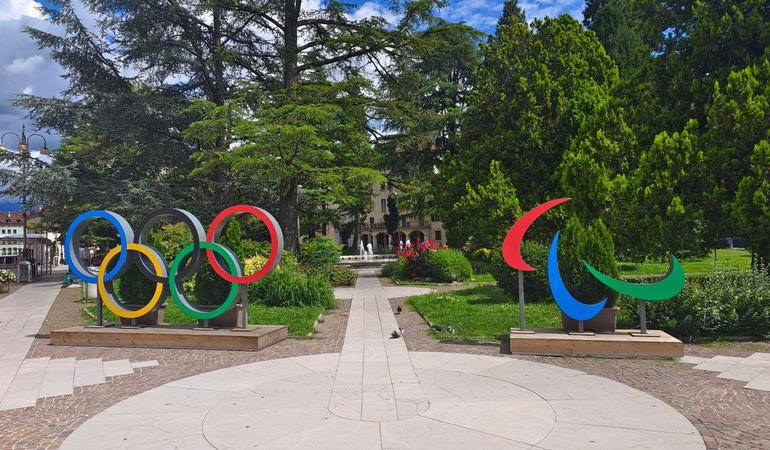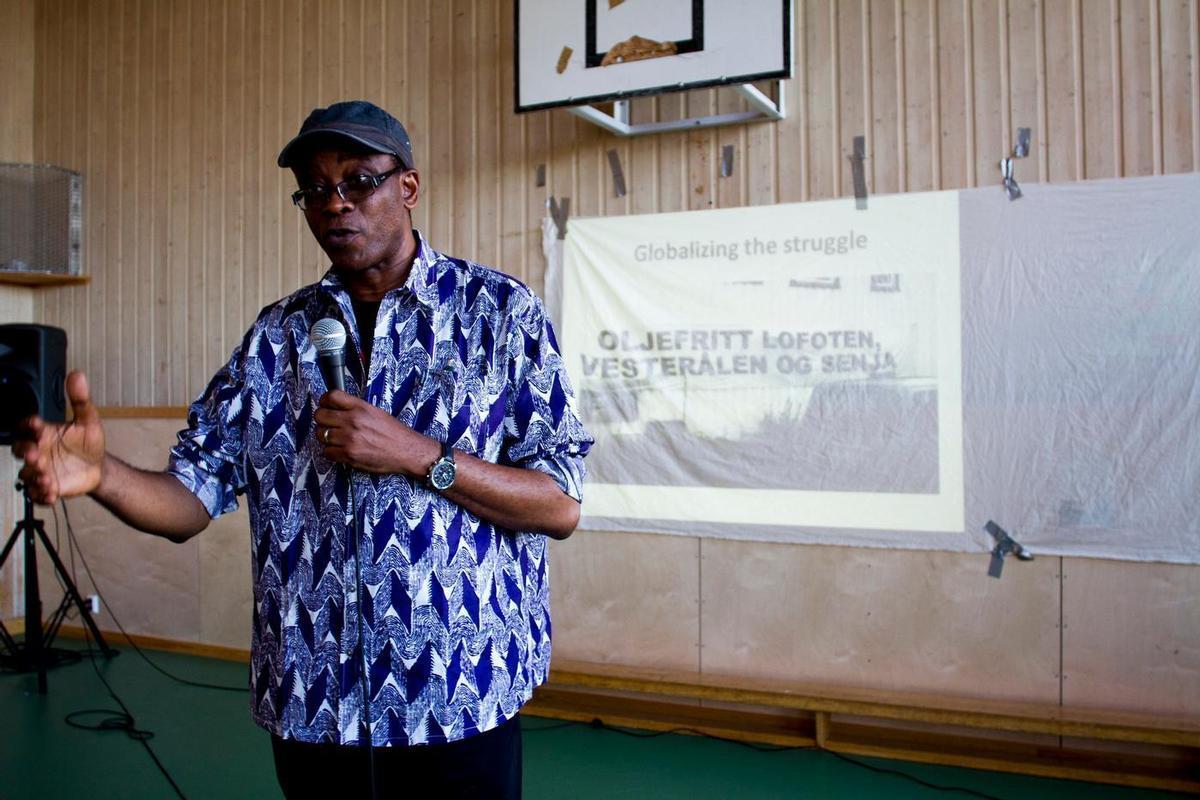
Milano-Cortina. Ecco come verranno spesi i 450 milioni di euro delle paralimpiadi



14 marzo 2023
Polluted water, uncultivable land: the situation in the Niger Delta — West Africa's main river — is now unsustainable. More than 13,000 people have taken the oil company Shell to the High Court in London for the damage it has caused to crops and fishing, and while farmers go hungry, the British giant continues to record profits: in 2022 alone, profits reached 40 billion, thanks in part to the price hikes following the Russian invasion of Ukraine.
Given the blockages to supplies from the north, European states have made agreements with countries on the African continent, but in many cases, underground exploration threatens protected areas
Given the blockages to supplies from the north, European states have made agreements with countries on the African continent, but in many cases, underground exploration threatens protected areas. Nnimmo Bassey, a Nigerian environmental activist and architect, won the Rights Livelihood Award in 2010 — an alternative Nobel prize — for denouncing the consequences of oil extraction in his country. We asked him about the situation on the continent and, in particular, to tell us who is still profiting from an ecological transition that is slow in coming south of the Mediterranean.
Mine is a country where oil extraction is a major source of income, but unfortunately, the consequences on the land are devastating
What is happening in Nigeria?
Mine is a country where oil extraction is a major source of income, but unfortunately, the consequences on the land are devastating. The continuous explorations in search of new deposits are destroying the environment, a story that has been going on for at least 60 years. Community lands have been polluted, water quality has deteriorated, endangering the health of people and animals, and damaging crops. Already in 2011, a report by the United Nations Environment Programme reported that it would take 25 to 30 years to clean up more than 50 years of oil operations in the Niger Delta from pollution. The Nisisioken Ogale community — which lives near a Nigerian National Petroleum Company pipeline in the Ogoniland region — was already drinking benzene-contaminated water.
What is the situation in the rest of Africa?
While the world says it wants to move away from fossil fuels, in Africa European states and large multinationals continue to invest in their extraction. Exploration and fracking — the fracturing of a rock layer by means of fluid pressure — are conducted in particularly sensitive and environmentally sensitive areas, including some World Heritage-listed sites.
Can you give some examples?
In Namibia, in the bed of the Okavango River, a Unesco-protected site, the Canadian company ReconAfrica is drilling. Little does it matter that 200,000 people depend on the natural balance provided by that watercourse; unfortunately, their demands are not taken into account. In a national park in Uganda, explorations are underway, but no digging should be done there. The country is home to the East African crude oil pipeline, a pipeline almost 1,500 kilometers long, connecting Uganda to Tanzania. This oil is then exported, with the wealth of the land being used by others, while we are left with nothing but damaged land. And in many cases, the people living in those areas are forced to move.
Is there any other infrastructure that is creating problems?
Nigeria is also affected by a pipeline that connects it to Morocco. It is an extension of the already existing West African gas pipeline, but its journey does not end on the Moroccan coast but in Cadiz, Spain. Once again, in Europe. Since the outbreak of the war in Ukraine, the EU has an immediate need for gas and is coming to Africa to get it.
More than 85% of the oil pipelines are for export. The region that is profiting most at the moment is the EU
Who is taking advantage of this?
More than 85% of the oil pipelines are for export. The region that is profiting most at the moment is the EU. These resources are not being used in local communities, but are ready to go to another part of the world. This is a colonial kind of practice.
Is there also illegal drilling?
Yes, especially in some areas like the desert in southern Algeria. Those responsible belong to communities that do not feel protected and listened to. In South Africa, on the other hand, local people have challenged the giant Shell.
What is the biggest challenge for Africa today?
The threats can be summarised in two words: climate change. Floods, droughts, food shortages, coastal erosion, intensive fishing, and desertification are all visible symptoms of the environmental crisis. And added to this is deforestation. Resources continue to be destroyed, dispersing millions of tonnes of climate-changing gases.
There was never any talk about the climate crisis. That is why we need people to mobilize, we need to press politics. As long as climate change is not put on the agenda as a priority, we cannot expect a change of pace
Do local communities matter?
In Nigeria, some groups have challenged the fossil fuel multinationals, following what is happening in the European Union and the United States. Even during the trial in Britain, thousands of people are demanding accountability for the destruction that multinationals have caused in the African state. This for me is a great achievement in recent times. As far as raising awareness on the ground is concerned, it must be acknowledged that groups are being created whose mission is to protect the environment against exploitation and to find a new balance between man and nature.
You are also a member of the Action Research Network for a Wellbeing Economy in Africa. What is meant by a wellbeing economy?
It is an economy that thinks about the future, not based on extractivism and on the use of natural resources — all practices that do not produce real benefits for those who inhabit these places. There are more philosophies on the continent that promote the well-being of all, without focusing on the wealth of a few, but on the solidarity of the community. This concept is expressed with the word Ubuntu, which marks the connection between people. In my language we say Eti Uwen, which translates to "good life": it does not matter how powerful you are and how much money you have, but with whom you live, that is, other humans and the natural world. These are two opposing visions: on the one hand an unsustainable approach, and on the other finding a balance between people and the environment.
In the recent Nigerian elections, Bola Tinubu won. What space did the climate change debate have during the campaign?
There was never any talk about the climate crisis. That is why we need people to mobilize, we need to press politics. As long as climate change is not put on the agenda as a priority, we cannot expect a change of pace. We cannot wait for politics, which is more interested in the transaction of money than energy.
You are also a poet and writer. Can literature convey a sense of responsibility towards the world we live in?
Through reading, we are able to convey the emotions that bind us to this planet. That is why books, but also films and even drama series, remind us of one great truth: we are not the only inhabitants of the Earth, and we must preserve the integrity of every being. Poetry is like music: it lingers in the mind and creates new imagery to tread. Learning from the words written by others teaches the great value of respect, fundamental to building a new future.
This article was translated by Kompreno with the support of DeepL.
La tua donazione ci servirà a mantenere il sito accessibile a tutti
Riformata. Così il governo vorrebbe la magistratura, ma l'obiettivo è solo limitarne il potere
La tua donazione ci servirà a mantenere il sito accessibile a tutti